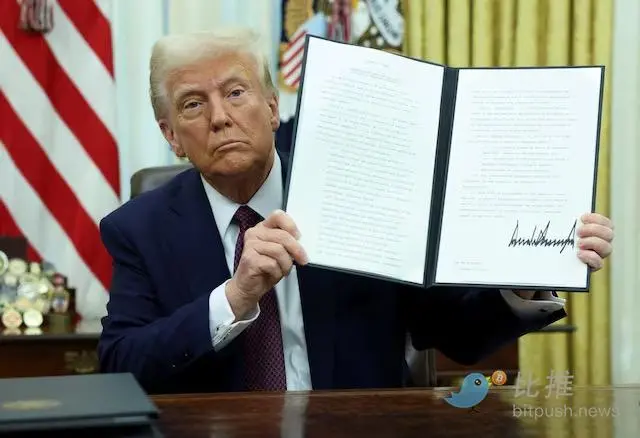Author: BitpushNews
On January 23, 2025, in the afternoon Eastern Time, U.S. President Trump officially signed an executive order on cryptocurrency, aimed at fulfilling his campaign promise to become the "cryptocurrency president."

According to Fox News, the details of the cryptocurrency executive order are as follows:
The executive order establishes a Presidential Digital Asset Market Working Group to strengthen the United States' leadership in the digital finance sector.
The task of the working group is to develop a federal regulatory framework for managing digital assets (including stablecoins) and to assess the establishment of a strategic national digital asset reserve.
The working group will be chaired by White House Artificial Intelligence and Cryptocurrency Czar David Sacks, with members including the Secretary of the Treasury, the Chair of the Securities and Exchange Commission, and heads of other relevant departments and agencies.
The White House Artificial Intelligence and Cryptocurrency Czar will hire top experts in digital assets and digital markets to ensure that the actions of the working group are guided by experts outside the federal government.
The executive order directs departments and agencies to identify and propose recommendations to the working group, indicating any regulations and other agency actions that should be revoked or modified that affect the digital asset sector.
The executive order prohibits agencies from taking any action to establish, issue, or promote Central Bank Digital Currency (CBDC).
The executive order rescinds the previous administration's digital asset executive order and the Treasury Department's framework for international engagement on digital assets, which stifled innovation and undermined the United States' economic freedom and global leadership in digital finance.
Bitpush Note:
Presidential executive orders are an important tool for the U.S. President to exercise executive power, playing a significant role in shaping domestic and foreign policy. However, the power of executive orders is limited and is subject to constraints from the Constitution, Congress, and the courts.
Executive orders are not laws: While executive orders have the force of law, their status is lower than that of laws.
The validity of executive orders is limited: The next president can modify or repeal the executive orders of the previous president.
Executive orders may provoke controversy: Executive orders often involve complex political and social issues, making them prone to controversy.
免责声明:本文章仅代表作者个人观点,不代表本平台的立场和观点。本文章仅供信息分享,不构成对任何人的任何投资建议。用户与作者之间的任何争议,与本平台无关。如网页中刊载的文章或图片涉及侵权,请提供相关的权利证明和身份证明发送邮件到support@aicoin.com,本平台相关工作人员将会进行核查。



